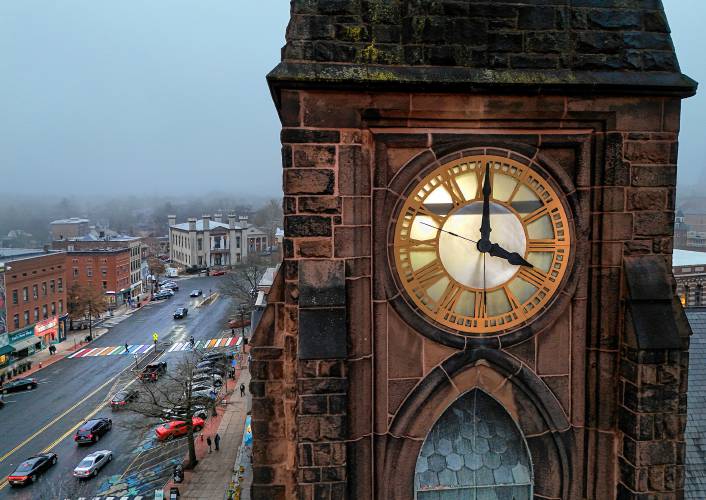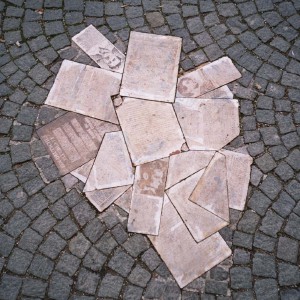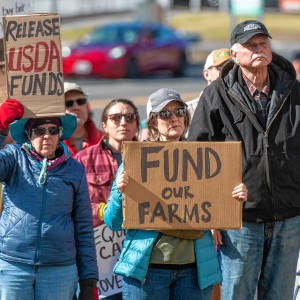Guest columnist Rutherford H. Platt: Reasons to question ‘trophy projects’

The clock at First Churches of Northampton glows on a dreary afternoon as fog rolls in over Main Street in Northampton. STAFF PHOTO/DAN LITTLE
| Published: 01-26-2024 7:01 PM |
On Jan. 5, 2023, the Northampton City Council celebrated the new year by allocating $1 million to each of Mayor Gina-Louise Sciarra’s two trophy projects: “Picture Main Street” and the Resilience Hub. These amounts were drawn from the COVID-era American Rescue Plan Act (ARPA) to help struggling businesses and households. Council minutes reveal an absence of critical discussion of the projects — the largest public investments in downtown Northampton’s history.
The first million went to Toole Design Inc., a Boston-based consulting firm. Since Toole was retained in 2018, City Hall’s fixation on installing dual bike lanes on Main Street — 700 yards long, interrupted by crosswalks and intersections — has been non-negotiable. Toole to date has received about $2.39 million to design “Picture Main Street” despite widespread criticism of the project and the lack of any formal city public hearings.
The second million dollars for the Resilience Hub has attracted even less public involvement. This amount was added to federal Community Development Block Grant funds, cannabis revenue, and $200,000 from Smith College to buy the former Baptist Church at 248 Main St. for $3,175,000 last June.
The concept of a “resilience hub” is admirable: a public place where struggling local residents can receive meals, medical and financial advice, and other social services. But the decision by City Hall to acquire and renovate the Baptist Church for that purpose is baffling. Among key issues swept under the political rug are: 1) its excessive purchase price; 2) its decrepit physical condition; 3) its lack of parking; 4) its location at a dangerous traffic intersection; and 5) its likely isolation due to traffic chaos if the city narrows Main Street.
Public purchase of land and buildings must legally be supported by a professional real estate appraisal. On Nov. 17, 2022 the city contracted with Bennett-Franklin Appraisers to estimate the market value of the Baptist Church. In a cover letter, former Planning Director Wayne Feiden stated: “The building is in amazing shape and a full renovation was 95% complete.” (Hmm.)
Mr. Feiden also revealed to Bennett-Franklin that “we have signed an option to purchase the building for $3.3 million.” And wonder of wonders, the appraisal value provided two weeks later was exactly $3.3 million — five times the property’s 2022 assessed value of $665,000. (The purchase of the Silverscape building at Main and King by Chase Bank a month earlier for $1.3 million was not mentioned.) Apparently the city did not try to negotiate a reduced price from the owner, Eric Suher, who might have been entitled to a tax deduction for the amount of the reduction if the appraisal was accepted by the IRS — a big if!
Worse yet, after decades of disuse the church building is far from “95% complete.” The renovations by Mr. Suher were to repurpose the structure as a performance venue and cocktail bar — an ambition thwarted by its lack of parking and the onset of COVID. The work needed to refit the building as a Resilience Hub was finally examined in a “Due Diligence” report of April 3, 2023 by Jones-Whitsett Architects that identified some two dozen major deficiencies.
To begin with, there is no heat or cooling equipment. Installed gas piping is unusable due to a moratorium on new gas connections. There is no kitchen. The interior lacks sheet rock, lighting, doors, windows and other necessities. As an intended performance venue, the floor in the former sanctuary now slopes toward a stage — unusable for a large-scale meal program. There is no elevator: Mayor Sciarra told the council on Dec. 15: “It has an elevator shaft so the entire building is fully accessible.” (Another hmm).
Article continues after...
Yesterday's Most Read Articles
There is no truck access and only four car parking spaces that are to be earmarked for city emergency staff. The mayor informed the council that parking is available in the Roundhouse lot, the Smith College garage, and Forbes Library.
On Dec. 1, the city retained Jones-Whitsett to prepare a detailed plan for “build-out” of the Baptist Church, a project estimated to cost at least $1.45 million. (Has anyone mentioned operating expenses?)
Three weeks after closing on the church on June 8, the city received title from the state to 33 King St., the modernist structure formerly housing the Registry of Deeds and Probate Court. With windows, walls, heat, level floors, and parking, that building stands vacant pending eventual sale by the city. Did anyone consider 33 King as a better choice for a Resilience Hub than the “incredible hulk on the hill?”
The sad moral of this story is the absence of public involvement, including a very passive City Council, in major decisions on how the city spends our money. With our streets and bike trails falling apart, schools facing layoffs, and critical infrastructure needing maintenance, the powers that be, like Roman emperors, lavish scarce resources on trophy projects without inviting public opinion on what needs doing and how best to do it.
It is time to demand accountability by our city elected officials (no more “let them eat cake” disdain). Trophy politics in Northampton must end.
Rutherford H. Platt is a resident of Florence and author of “Reclaiming American Cities: The Struggle for People, Place, and Nature Since 1900.” He is an emeritus professor of geography at the University of Massachusetts Amherst.






 Guest columnist John Paradis: White Rose legacy transcends, inspires
Guest columnist John Paradis: White Rose legacy transcends, inspires Guest columnist U.S. Sen. Edward J. Markey: Fighting for our farmers
Guest columnist U.S. Sen. Edward J. Markey: Fighting for our farmers Naomi Tannen: DEI makes America great
Naomi Tannen: DEI makes America great Karen Traub: What to do when tax dollars fund millionaire golf games instead of libraries
Karen Traub: What to do when tax dollars fund millionaire golf games instead of libraries
